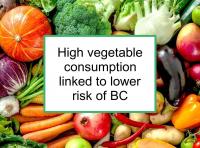A large new prospective study has reported that Italian women with high consumption of vegetables have a 35% lower risk of breast cancer than those with low vegetable intake. The study was designed to investigate the association between vegetable and fruit consumption and risk of breast cancer.
Mediterranean populations consume a wide variety of vegetables and fruits, which makes this a favorable setting for evaluating the influence of these foods.
The study included more than 31,000 women aged 36 to 64 years in the Italian part of the European Prospective Investigation into Cancer and Nutrition study for whom data concerning dietary and lifestyle information and body measurements were available. The women were recruited between 1993 and 1998 and followed for a median of 11.25 years. A total of 1,072 invasive and in situ incident breast cancers were diagnosed during follow up.
All analyses were performed while adjusting for known breast cancer risk factors such as level of education, body mass index, physical activity, reproductive history, use of hormone replacement therapy, alcohol consumption and smoking habits.
Women in the highest fifth of vegetable consumption (including all types of vegetables) were found to have a 35% lower risk of breast cancer compared to women in the lowest quintile. When subtypes of vegetables were considered separately, women in the highest fifth of leafy vegetable intake were found to have a 30% lower risk of breast cancer than those in the lowest fifth. Leafy vegetables consumed in Italy include lettuce, spinach, kale, and parsley, as well as greens such as arugula. Women in the highest fifth of fruiting vegetable intake were found to have a 25% lower risk of breast cancer than those in the lowest fifth.
Fruiting vegetables, which are grown for their fruits rather than their leaves, seeds or roots, include tomatoes, cucumbers, hot and sweet peppers, and eggplant. Consumption of raw tomatoes was also found to be associated with lower risk of breast cancer and this association was dose dependent (the higher the tomato consumption, the lower the risk). On the other hand, no association with breast cancer risk was found for overall intake of fruit, fruit subtype, or individual fruit. The authors conclude that a clear protective role of increasing vegetables consumption (primarily leafy and fruiting vegetables) on breast cancer risk was found in this population.
Consuming a variety of vegetables is best
While the study results show specific reductions in breast cancer risk for leafy green (30%) and fruiting (25%) vegetables, the risk reduction was highest for overall vegetable consumption (35%). This indicates that consuming a wide variety of vegetables, including other types such as root (e.g., carrots, turnips) or allium vegetables (onions, garlic), has a potentially more beneficial effect on breast cancer risk than focusing exclusively on leafy green or fruiting vegetables.
Italian women have been studied far more extensively than U.S. women with respect to diet and breast cancer. The Italian diet differs from the typical U.S. diet in that the intake of olive oil tends to higher and consumption of meat tends to be lower in Italy. However, not all Italians consume healthy diets. For example, a high intake of pastries, sweets and other high glycemic index foods has been found to be associated with increased risk of breast cancer in several Italian studies.
Please see our article on how to optimize your breast cancer diet for information on what to eat during all stages of treatment and recovery.
